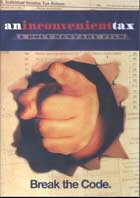
An Inconvenient Tax 2013
Distributed by Seventh Art Releasing, 1614 N. Fairfax Ave., Los Angeles, CA 90046; 323-845-1455
Produced by Observer Productions
Directed by Christopher P. Marshall
DVD, color, 78 min.
Sr. High - General Adult
Business, History, Political Science
Date Entered: 07/31/2014
Reviewed by Michael J. Coffta, Business Librarian, Bloomsburg University of PennsylvaniaAn Inconvenient Tax discusses the far-reaching impacts of income taxation in the US, its linkage to democracy, and the monstrosity of complexities in the voluminous tax system. The filmmakers contend that the US needs an efficient way for the US government to raise revenue that is perceived as transparent and fair by populace. With a steady flow of interviews with financial experts, authors, and former government officials, the film introduces terms and concepts to establish a basis for exploration.
The filmmakers carefully weave historical exposition together with analysis of the milestones in the evolution of taxation. The film deftly points out that the US was born of tax revolt, with the Boston Tea Party and the Revolutionary War. The documentary sequentially deals with developments, rationales, and challenges of issues such as charitable deductions and deductions for retirement plans. Further, it systematically reviews the bases for moderate to radical tax reform proposals, including the Steve Forbes flat tax, the value-added tax, and the elimination of the death tax. The film concludes with a perceptive look at the political dimension of taxation, and its conspicuous interference to tax reform. It examines the political gamesmanship involved in cutting spending and cutting taxes and tax relief.
Despite the challenging topic of this work, the filmmakers placed a high value on humor in the production of this film. There is prevalent use of humorous film clips throughout, such as black and white clips of old-time campy monster movies. Similarly, the film makes use of an actor dressed as Uncle Sam to add a dose of visual appeal.
Neophytes to tax studies need not be intimidated by this film. It serves as a benefit to all, as it introduces and explains terminology with very familiar expressions. The real strength of this work is its exploration of the justifications for certain tax practices and proposals. Although it argues for a more simplified system, it does very well in explaining how the present system came to be. This is a lucid, entertaining, informative, and, at times somber, analysis of taxation in the US.